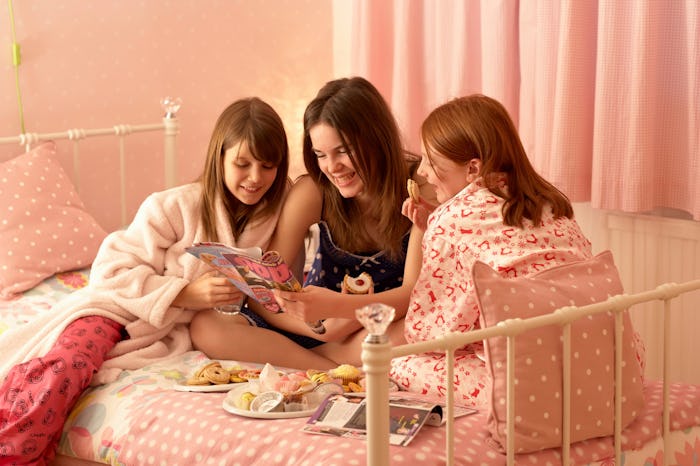Life

Here's How To Know If Your Kid Is Old Enough For A Slumber Party
Sleepovers are one of childhood's great rites of passage. They can be fun and exciting, but may also trigger anxiety and homesickness, especially in younger kids. When I look back at my own experiences spending the night at a friend's house, I remember the fun of watching the latest music videos (we didn't have cable at home), talking late into the night, and eating donuts for breakfast. I also remember getting so homesick that I called my mom in the middle of a sleepover to ask her to pick me up. So when are kids old enough to sleep over? Like many parenting decisions, the answer will depend on your individual child and their personality, temperament, and level of maturity.
I sat down with Dr. Meghan Prato, Psy.D., an expert in child psychology and family therapy, to discuss the signs of readiness you should look for in your kids before sending them on a sleepover. We also talked about what parents can do to ensure kids have a safe and pleasant experience.
Overall, Prato says, there isn't much research on the right age for kids to sleep over. She explains that it's better to focus on "things that they're able to do rather than a number." Prato estimates that most kids start to develop these skills around 5 or 6, but aren't fully able to problem solve until 8, 9, or 10. So, according to Prato, 8 is the earliest age to consider the signs of sleepover readiness, like making sure your child understands concrete events including where they are going, what the expectations are, and how they should act.
Prato notes that your child should also be able to self-regulate emotions and resolve peer conflict on their own without tattling to an adult. You still want your child to tell you about these issues later — what happened and how they handled it — but in the moment, they should be able to work through conflicts without adult intervention. If kids are still having a lot of physical or emotional fights at school or on playdates, they're probably not ready to sleep over.
Before sending them off to a slumber party, you also want to make sure that your child can identify what is right and wrong, which differs from family to family. For example, when it comes to crossing the street, is your child allowed to do this on their own or do you want them to cross with an adult? Whatever rules and values your family has, you want to know that your kids are mature enough to remove themselves from any situation you wouldn't approve of, and take the appropriate steps to manage it. Of course, some things are more important than others. Safety habits, for example, are non-negotiable, but it may not matter as much if your child drinks a soda, even if you wouldn't normally allow it.
Once kids are ready to sleep over, parents should develop a pre-sleepover set of questions about safety and shared values. I asked Prato if she thought the current generation of parents overthinks and worries too much. Were parents more laidback about sleepovers in the past? Prato thinks it's good to be informed, though it can be hard to know when to stop asking questions. "If you're worried," she says, "You probably haven't asked enough questions." In other words, trust your gut and don't be afraid to be annoying. Making sure your child will be safe and well supervised is more important than what other parents think. Prato also reminds parents that a lot of this screening has already happened informally over the years as you've taken your child on playdates and cultivated a social circle of friends and classmates. However, it's still a good idea to have a basic set of questions to ask, such as the following:
- Where is my child going?
- Who will be responsible for the kids during the sleepover?
- Where will my child sleep?
- How much supervision and structure will there be? Generally, Prato says, the younger the kid, the more adult attention and direction they'll need.
- Who else lives in the house (such as a friend or relative of the immediate family)?
- Is the house safe? Are there any firearms or alcohol in the house?
- Does this family share my values?
Deciding when your child is ready for their own phone is another big decision, but you may want to create a "sleepover phone" or "activity phone," which could be an old flip phone or pre-paid TracFone. Then you know your child will be able to call or text you for help if they need to, even if the house doesn't have a landline. Before you say goodbye, let your child know there is always an out if they want to go home. Make sure you will be available to pick them up at any time if they decide they're not ready after all. With all this in mind, your kid will be ready and excited to embark on their first sleepover. You've done the necessary screening and feel good about dropping your child off. Now you just have to wait to hear all about their first round of truth or dare.
Check out Romper's new video series, Romper's Doula Diaries:
Check out the entire Romper's Doula Diaries series and other videos on Facebook and the Bustle app across Apple TV, Roku, and Amazon Fire TV.